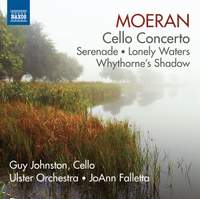Recording of the Week,
Moeran Cello Concerto from Guy Johnston
This week I’ve been getting better acquainted with Ernest John Moeran: my only previous encounter with his music had been via a performance of the lovely elegiac Lonely Waters at university in a concert of works by lesser-known English pastoralists, but over the past few days I’ve come to realise that there’s so much more to this composer than green leafy late-Romanticism. This new recording of the Cello Concerto (plus three shorter orchestral works, all well worth exploring) by Guy Johnston, JoAnn Falletta and the Ulster Orchestra reveals a far spikier, more cosmopolitan voice than I’d expected, almost as if Britten and Shostakovich had added their fingerprints to something by Holst or Vaughan Williams.

Born in Hounslow in 1895, Moeran was the son of an Irish clergyman: he was educated at Uppingham and the Royal College of Music, where his studies with Stanford were curtailed by the outbreak of World War One. Following a head-wound in 1917, he remained in convalescence for the rest of the hostilities and eventually returned to the College after the War to resume composition studies with John Ireland. Like Vaughan Williams (and indeed Mahler and Bartok), he became fascinated with folk-song, first in Norfolk, Suffolk and rural Kent (where he lived during the 1920s), and later in County Kerry as he reconnected with his Irish roots: much of his inspiration came from simply sitting in rural pubs until the locals burst into song.
During the 1930s Moeran struck up a close friendship with the notorious hell-raiser Peter Warlock, which turned out to be something of a mixed blessing: the two men clearly sparked off each other creatively (Warlock’s influence rears its head on occasion in the Moeran Serenade on this disc, where the archaic dance rhythms and cod-Tudor harmonies call to mind Warlock’s Capriol Suite), but the drunken excesses which Warlock took in his stride affected Moeran much more deeply, and his later years were blighted by chronic alcoholism and mental illness, possibly compounded by the legacy of his war-wound.
The Cello Concerto was one of Moeran’s last major compositions, written in 1945 for the English cellist Peers Coetmore, whom he married in the same year. It grabbed my attention from the brooding opening bars, strangely familiar yet new: my colleague heard echoes of the beginning of Vaughan Williams’s Fifth Symphony, but I was reminded of the Sea Interludes from Britten’s Peter Grimes which premiered that same year. The work is essentially through-composed, but falls into four fairly distinct sections: the punchy scherzo feels jazz-influenced in places, with the syncopated rhythms and sassy brass-writing suggesting William Walton (the second movement of the Viola Concerto springs to mind), whilst the beautiful B flat major slow ‘movement’ is easily as haunting as the Adagio from Elgar’s Cello Concerto, with more than a soupçon of The Lark Ascending. It’s in the final section that Moeran’s beloved folk-songs come into play, with plenty of open strings, scampering violins and rumbustious modal melodies. Guy Johnston is a wonderful ambassador, eloquent yet never saccharine in the elegiac passages, feisty and big-boned in the exuberant outbursts.
If you treasure the Elgar and Walton Concertos, or are open to the idea of a Lark Ascending with a sting in its tail, then I’d strongly advise you to take a punt on this disc: you can certainly have fun playing ‘spot the influence’ as you go along, but Moeran is still very much his own man, and his soaring melodies will imprint themselves after just one listening.
Guy Johnston (cello), Ulster Orchestra, JoAnn Falletta
Available Formats: CD, MP3, FLAC



